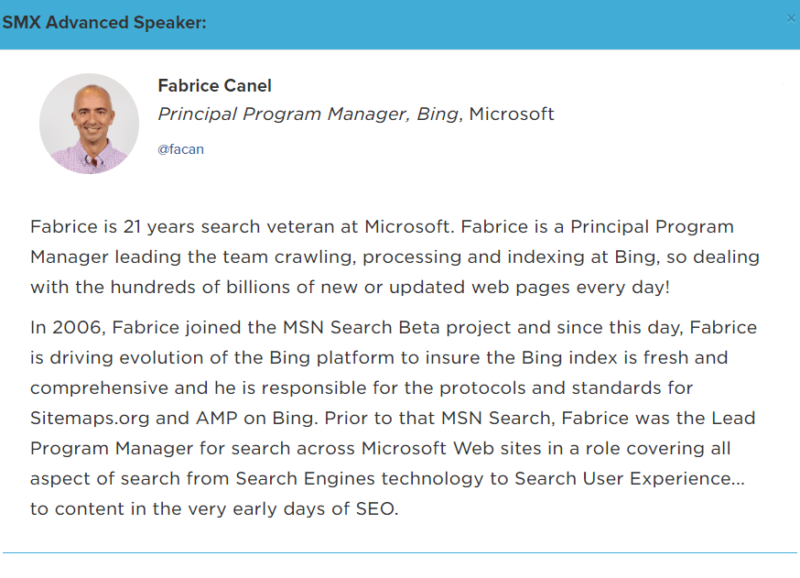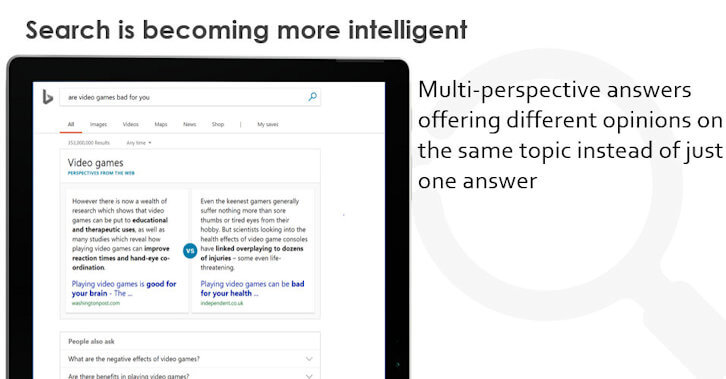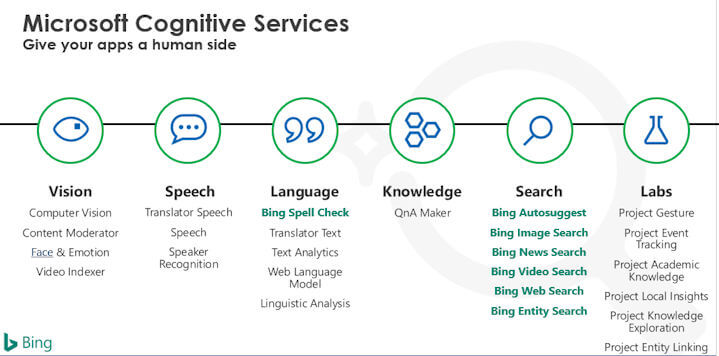 For the opening session of SMX Advanced, we were treated to a keynote by Bing’s Fabrice Canel. Here are my notes from that session.
For the opening session of SMX Advanced, we were treated to a keynote by Bing’s Fabrice Canel. Here are my notes from that session.

Fabrice started by pointing out that search is becoming more intelligent. For example, search engines are getting better at sentiment analysis. If you search on whether video games are good for you, you’ll get one set of results, and if you search on whether they are bad for you, you’ll get a different set of results.
You can also get multiperspective answers offering different opinions. Bing does this in featured snippets, as shown here by this sample result:

As Bing prepares for continued growth in voice interactions, it is becoming more conversational in its approach to search.
For example, if a user asks a very broad query which could have several intents, Bing will ask a clarifying question, as you’ll see here:

And where it’s appropriate, search is becoming more visual.

More and more technology is being applied to help search become more human as well, allowing interactions with people to become more natural:

With all of this, search engine optimization (SEO) is evolving, too. The basics still apply. Be sure to optimize your web pages, and pay attention to:
- Using title tags.
- Meta descriptions.
- Heading tags.
- Writing great, descriptive content.
- Ensuring your site is crawlable.
Basically, don’t forget your SEO 101!
So, what is new? There are many new destinations for content (desktop, mobile, voice) and many new ways to distribute and duplicate that content. There are new standards such as accelerated mobile pages (AMP) and much more.
Search engine optimization also has to deal with content being cached on content delivery networks (CDNs) and content being hosted in the cloud. This leads to new challenges with setting up integrated analytics and managing content across multiple platforms to help keep it all in sync.
Artificial intelligence
Next, Fabrice told us that “artificial intelligence (AI) is tech that can perceive, learn, reason and assist in decision-making and act to help solve problems.” He said, “One area that Bing is using AI heavily is to invest in making a smarter crawler.”
This is important because the web presents many complex problems, such as:
- Determining what content has changed and not changed.
- What content has been removed or disappeared.
- What content is new.
- Detecting duplicate content.
- Handling mobile and desktop.
- Handling JavaScript.
- Handling cascading style sheets (CSS).
Dealing with these items on even a single site is complex, but when you bring them to web scale, they become incredibly complex. AI techniques can make these easier to deal with.
In March of 2018, Bing announced support for schema implemented in JSON-LD. At this year’s SMX Advanced, they announced Bing has extended that support to allow for debugging of that JSON-LD in Bing Webmaster Tools.
Fabrice did clarify that Bing will not prefer JSON-LD over other forms of markup, as the web is an open environment.
Bing also announced extended support for AMP.

This specifically includes support for viewing AMP pages from the Bing CDN when users click on an AMP page in the Bing results. This support is similar to that offered by Google. Below is a screen shot Fabrice showed:

One very popular SEO question came up, which is whether or not Bing intends to show voice queries separately in their Webmaster Tools. Fabrice indicated that they don’t do that, and it’s not on their roadmap to implement.
Overall, this was a great session and an excellent opportunity to get more insight into what’s going on at Bing. The industry tends to focus a lot of attention on Google, but Bing offers a very robust search experience, and understanding what they’re thinking and doing is invaluable.
Contributing authors are invited to create content for Search Engine Land and are chosen for their expertise and contribution to the search community. Our contributors work under the oversight of the editorial staff and contributions are checked for quality and relevance to our readers. The opinions they express are their own.



